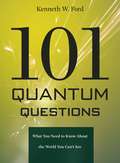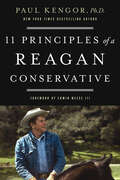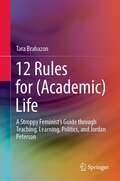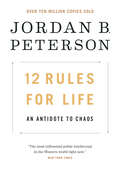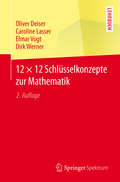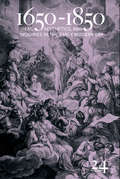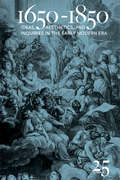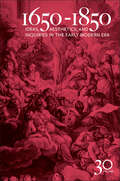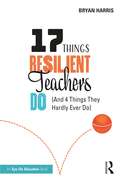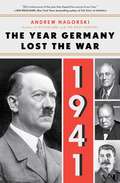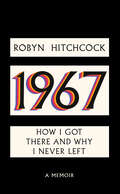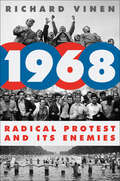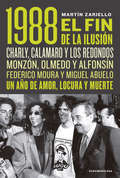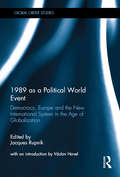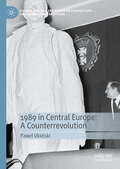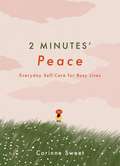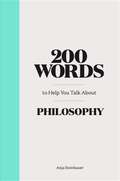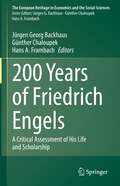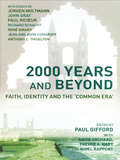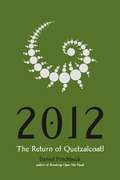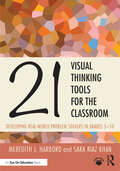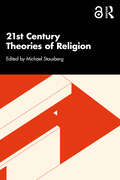- Table View
- List View
101 Quantum Questions: What You Need To Know About The World You Can't See
by Kenneth William FordThis reader-friendly, richly illustrated book provides an engaging overview of quantum physics, from "big ideas" like probability and uncertainty and conservation laws to the behavior of quarks and photons and neutrinos, and on to explanations of how a laser works and why black holes evaporate.
11 Principles of a Reagan Conservative
by Paul KengorPerhaps no other president's name is invoked by politicians as much as Ronald Reagan's. Every election, as presidential hopefuls jockey for the Republican nomination, each one claims to be a Reagan conservative. But are these candidates truly carrying on the mantle of Ronald Reagan, or are they abusing the memory of our great president? What did Ronald Reagan really believe? In 11 Principles of a Reagan Conservative, biographer Paul Kengor analyzes Ronald Reagan's speeches and actions to paint a full, accurate picture of his beliefs. Kengor identifies these principles that lie at the crux of Reagan's conservatism; Freedom, Faith, Family, Sanctity and Dignity of Human Life, American Exceptionalism, The Founders' Wisdom and Vision, Lower Taxes, Limited Government, Peace Through Strength, Anti-Communism, and Belief in the Individual. And it is through these principles that Reagan's modern emulators may create a successful, conservative future.Many a politician has asked: What would Reagan do if he were president now? Where would Reagan stand on today's issues? Who is the next Ronald Reagan? Paul Kengor dissects Reagan's presidency and provides decisive conclusions. The answers to some of these questions may surprise conservatives and liberals alike.
12 Rules for (Academic) Life: A Stroppy Feminist’s Guide through Teaching, Learning, Politics, and Jordan Peterson
by Tara BrabazonThese are strange times. Climate crises. Health crises. Collapsing systems. Influencers. And yes - Jordan Peterson.We are currently living in a (Post) Peterson Paradigm. This book – 12 Rules for (Academic) Life - explores what has happened to teaching, learning and politics through this odd and chaotic intervention. Deploying feminism, this lens and theory offers a glass-sharpened view of this moment in international higher education. It is organized through twelve mantras for higher education in this interregnum, and offers new, radical, edgy and passionate methodologies, epistemologies and ontologies for a University sector searching for a purpose. This is a feminist book which targets a feminist audience, both inside and outside higher education. It presents a clear focus on how this Peterson moment can be managed and challenged, when in future such academics deploy social media in this way. This book is also a part of higher education studies, exploring the role of the public / critical / dissenting / organic intellectual in debates about the political economy, identity/politics and leadership.A question of our time – through a climate emergency, a pandemic and polarized politics – is why Professor Jordan Peterson gained profile and notoriety. The Jordan Peterson moment commenced in September 2016 with his YouTube video, “Professor against political correctness,” and concluded with his debate with Slavoj Zizek on April 19, 2019. From this moment, his credibility was dented, if not destroyed.Jordan Peterson infused scholarly debates with Punch and Judy extremism and misunderstandings. Instead, this book offers research rather than certainty, interpretation rather than dogma, evidence rather than opinion, and theory rather than ‘moral truth.’ The goal is to recalibrate this (Post) Peterson Paradigm, to take stock of how this moment occurred, and how to create a revision of higher education.
12 Rules for Life: An Antidote to Chaos
by Jordan B. PetersonWhat does everyone in the modern world need to know? Renowned psychologist Jordan B. Peterson's answer to this most difficult of questions uniquely combines the hard-won truths of ancient tradition with the stunning revelations of cutting-edge scientific research.Humorous, surprising and informative, Dr. Peterson tells us why skateboarding boys and girls must be left alone, what terrible fate awaits those who criticize too easily, and why you should always pet a cat when you meet one on the street. What does the nervous system of the lowly lobster have to tell us about standing up straight (with our shoulders back) and about success in life? Why did ancient Egyptians worship the capacity to pay careful attention as the highest of gods? What dreadful paths do people tread when they become resentful, arrogant and vengeful? Dr. Peterson journeys broadly, discussing discipline, freedom, adventure and responsibility, distilling the world's wisdom into 12 practical and profound rules for life. 12 Rules for Life shatters the modern commonplaces of science, faith and human nature, while transforming and ennobling the mind and spirit of its readers.
12 × 12 Schlüsselkonzepte zur Mathematik
by Oliver Deiser Caroline Lasser Elmar Vogt Dirk WernerWie ist ein Ring definiert, wann kann man Grenzprozesse vertauschen, was sind lineare Ordnungen und wozu benötigt man das Zornsche Lemma in der Linearen Algebra? Das Buch will seinen Lesern helfen, sich in der Fülle der grundlegenden mathematischen Definitionen zurecht zu finden und exemplarische mathematische Ergebnisse einordnen und ihre Eigenheiten verstehen zu können. Es behandelt hierzu je zwölf Schlüsselkonzepte der folgenden zwölf Themengebiete der Mathematik: Grundlagen Zahlen Zahlentheorie Diskrete Mathematik Lineare Algebra Algebra Elementare Analysis Höhere Analysis Topologie und Geometrie Numerik Stochastik Mengenlehre und Logik Ein besonderes Augenmerk liegt auf einer knappen und präzisen, dabei aber nicht zu formalen Darstellung. Dadurch erlauben die einzelnen Beiträge ein fokussiertes Nachlesen ebenso wie ein neugieriges Kennenlernen. Das Buch ist geschrieben für Studierende der Mathematik ab dem ersten Semester und möchte ein treuer Begleiter und eine zuverlässige Orientierungshilfe für das gesamte Studium sein. Die 2. Auflage ist vollständig durchgesehen und um Literaturangaben ergänzt.
14 aprendizajes vitales
by Carlos Alemany BrizLa vida es un continuo -y realmente complejo- proceso de aprender y desaprender. Y también un cúmulo de ocasiones perdidas en las que decidimos no querer aprender ni tampoco desaprender.Gran parte de los aprendizajes los recibimos de una manera estructurada: en la familia, en el jardín de infancia o en el colegio, en el trabajo o en la universidad, nos enseñan -y aprendemos- muchas cosas. Todos estos aprendizajes, que podríamos llamar formales, representan la base primordial de nuestra educación.Sin embargo, el fluir vital y el desarrollo del ciclo personal está también lleno -y mucho- de aprendizajes que uno ha tenido que hacer sin que nadie se los enseñe de una manera formal. Algunos de estos aprendizajes son dolorosos, otros son gozosos y el profundizar en todos ellos y dar con la clave motivadora de ese aprender a aprender es de gran ayuda para la propia evolución personal.Este libro, escrito en colaboración por un conjunto de especialistas, de forma narrativa, pedagógica y serendípica, pretende favorecer esta reflexión y facilitar estos otros aprendizajes. Los temas los hemos elegido entre los que nos parecen más vitales y necesarios en la sociedad de hoy, sabiendo de antemano que la lista es más amplia que los aquí elegidos.Las excelentes ilustraciones de Ángel Rz. Idígoras, psicólogo, dibujante e ilustrador, contribuyen a dar el tono de invitación gozosamente humana a leer y a poner en práctica estos nuevos aprendizajes vitales. Ojalá que cada uno encuentre en estos capítulos -leídos serendípicamente en su mecedora o en su rincón favorito y practicados los ejercicios que se sugieren- las pistas, las preguntas, las respuestas o el tema que se ajuste más y mejor a su propio momento vital.
150 Jahre Gesetzgebung in Deutschland: Entwicklungen des Gesetzgebungsverfahrens von der konstitutionellen Monarchie 1871 bis zur parlamentarischen Demokratie 2021
by Martin H. MöllersDieses Buch erläutert die verfassungsmäßige Ausgestaltung der Gesetzgebungsverfahren im Kaiserreich, in der Weimarer Republik und in der Bundesrepublik Deutschland im Zusammenhang. Dadurch wird nachvollziehbar, dass die Gesetzgebung der heutigen parlamentarischen Demokratie ihre Basis bereits in der konstitutionellen Monarchie des Deutschen Kaiserreichs vor 150 Jahren hat. Obwohl das Verfahren der Gesetzgebung im Kaiserreich vordemokratisch ausgestaltet war, sind ihre wesentlichen Merkmale bis heute unverändert. Welche Änderungen die Gesetzgebungsverfahren von Verfassung zu Verfassung im Einzelnen erfuhren, analysiert das Buch und stellt heraus, dass diese Änderungen vor allem das Bund-Länder-Verhältnis, die Volkssouveränität sowie den Einfluss der Grundrechte auf die Gesetzgebung betrafen. Dabei kommen auch Auffassungen der Staatsrechtslehre früherer Zeiten zur Rechtsstaatlichkeit zur Sprache, die immer noch zum derzeitigen Meinungsspektrum zählen, heute jedoch nicht mehr zu halten sind. Zudem dokumentiert das Buch, wer an den Gesetzgebungsverfahren offiziell und wer faktisch beteiligt war bzw. noch ist und welche politischen Einflussnahmen auf die Gesetzgebung im Lauf der Geschichte festzustellen sind. So wird u.a. dokumentiert, dass insbesondere der Mangel an Transparenz der Zusammenarbeit von Exekutive und Legislative mit Lobbyisten dazu führt, dass viele Gesetze einzelne Bevölkerungsgruppen oder Wirtschaftszweige bevorzugen.
1650-1850: Ideas, Aesthetics, and Inquiries in the Early Modern Era (Volume 24) (1650-1850 Ser. #Vol. 4)
by Kevin L. Cope1650-1850 publishes essays and reviews from and about a wide range of academic disciplines—literature (both in English and other languages), philosophy, art history, history, religion, and science. Interdisciplinary in scope and approach, 1650-1850 emphasizes aesthetic manifestations and applications of ideas, and encourages studies that move between the arts and the sciences—between the “hard” and the “humane” disciplines. The editors encourage proposals for “special features” that bring together five to seven essays on focused themes within its historical range, from the Interregnum to the end of the first generation of Romantic writers. While also being open to more specialized or particular studies that match up with the general themes and goals of the journal, 1650-1850 is in the first instance a journal about the artful presentation of ideas that welcomes good writing from its contributors. First published in 1994, 1650-1850 is currently in its 24th volume. ISSN 1065-3112. Published by Bucknell University Press. Distributed worldwide by Rutgers University Press.
1650-1850: Ideas, Aesthetics, and Inquiries in the Early Modern Era (Volume 25) (1650-1850 Ser. #Vol. 4)
by Jack Lynch Pat Rogers Kate Brown Sarah Stein Richard P. Heitzenrater Yu Liu Suzanne L. Barnett Mark G. Spencer Malcolm Jack Isabel Rivers Nigel Penn Robin Runia Samara Anne Cahill Claude Willan Howard Weinbrot Molly Marotta Anthony W Lee Daniel Gustafson James Horowitz Philip S. Palmer R.J.W. Mills Christopher Trigg Roy Bogas Gefen Bar-On Santor Jane R. Stevens Paula Pinto Tamara WagnerVolume 25 of 1650–1850: Ideas, Aesthetics, and Inquiries in the Early Modern Era investigates the local textures that make up the whole cloth of the Enlightenment. Ranging from China to Cheltenham and from Spinoza to civil insurrection, volume 25 celebrates the emergence of long-eighteenth-century culture from particularities and prodigies. Unfurling in the folds of this volume is a special feature on playwright, critic, and literary theorist John Dennis. Edited by Claude Willan, the feature returns a major player in eighteenth-century literary culture to his proper role at the center of eighteenth-century politics, art, publishing, and dramaturgy. This celebration of John Dennis mingles with a full company of essays in the character of revealing case studies. Essays on a veritable world of topics—on Enlightenment philosophy in China; on riots as epitomes of Anglo-French relations; on domestic animals as observers; on gothic landscapes; and on prominent literati such as Jonathan Swift, Arthur Murphy, and Samuel Johnson—unveil eye-opening perspectives on a “long” century that prized diversity and that looked for transformative events anywhere, everywhere, all the time. Topping it all off is a full portfolio of reviews evaluating the best books on the literature, philosophy, and the arts of this abundant era. Published by Bucknell University Press. Distributed worldwide by Rutgers University Press.
1650-1850: Ideas, Aesthetics, and Inquiries in the Early Modern Era (Volume 30) (1650-1850)
by Christopher D. Johnson Susan Spencer Lynn Festa Anthony W. Lee Victoria Barnett-Woods Ashley Bender Yvonne Fuentes Melanie Hayes Pamela F. Phillips Michael J. Mulryan Duane Coltharp Courtney A. Hoffman Flavio Gregori Steven Minuk Andie Barrow Ross W. Beales Jr. Stephanie Koscak Corey Risinger Youenhee Kho Donald W. Nichol Christopher VilmarExploratory, investigative, and energetically analytical, 1650–1850 covers the full expanse of long-eighteenth-century thought, writing, and art while delivering abundant revelatory detail. Essays on well-known cultural figures combine with studies of emerging topics to unveil a vivid rendering of a dynamic period, simultaneously committed to singular genius and universal improvement. The contributors to volume 30 join with Enlightenment thinkers in pulling, pushing, and stretching the elastic boundaries of human experience. Essays on comical apocalypticism, the evolution of satire, and the Asian periphery of English literature open a volume that offers two special features on extreme aspects of a modernizing world. The first probes the undiscovered world of last wills and testaments, while the second explores the soaring world of eighteenth-century birds. As always, 1650–1850 culminates in a bevy of book reviews critiquing the latest scholarship on long-established specialties, unusual subjects, and broad reevaluations of the period. Published by Bucknell University Press. Distributed worldwide by Rutgers University Press. ISSN: 1065-3112
17 Things Resilient Teachers Do: (And 4 Things They Hardly Ever Do)
by Bryan HarrisThis book will help you learn practical ways to manage the stress of teaching and avoid burnout. Bestselling author and educational consultant Bryan Harris presents strategies for building resilience, including reframing, understanding the power of "no", focusing on what you can control, building positive relationships, advocating for yourself, and more. Each chapter clearly presents concise and practical applications that you can implement right away. With this guidebook, you’ll feel ready to bounce back from challenges and stay focused on the joys of the profession.
1941: The Year Germany Lost the War
by Andrew NagorskiBestselling historian Andrew Nagorski &“brings keen psychological insights into the world leaders involved&” (Booklist) during 1941, the critical year in World War II when Hitler&’s miscalculations and policy of terror propelled Churchill, FDR, and Stalin into a powerful new alliance that defeated Nazi Germany. In early 1941, Hitler&’s armies ruled most of Europe. Churchill&’s Britain was an isolated holdout against the Nazi tide, but German bombers were attacking its cities and German U-boats were attacking its ships. Stalin was observing the terms of the Nazi-Soviet Pact, and Roosevelt was vowing to keep the United States out of the war. Hitler was confident that his aim of total victory was within reach. But by the end of 1941, all that changed. Hitler had repeatedly gambled on escalation and lost: by invading the Soviet Union and committing a series of disastrous military blunders; by making mass murder and terror his weapons of choice, and by rushing to declare war on the United States after Japan&’s attack on Pearl Harbor. Britain emerged with two powerful new allies—Russia and the United States. By then, Germany was doomed to defeat. Nagorski illuminates the actions of the major characters of this pivotal year as never before. 1941: The Year Germany Lost the War is a stunning and &“entertaining&” (The Wall Street Journal) examination of unbridled megalomania versus determined leadership. It also reveals how 1941 set the Holocaust in motion, and presaged the postwar division of Europe, triggering the Cold War. 1941 was &“the year that shaped not only the conflict of the hour but the course of our lives—even now&” (New York Times bestselling author Jon Meacham).
1967: How I Got There and Why I Never Left
by Robyn HitchcockThe great eccentric of British psychedelia—beloved by everyone from Led Zeppelin and R.E.M. to the late Jonathan Demme—pens a singularly unique childhood memoir . . . “A bright, nostalgic look at the exhilaration of 1967, this book—illustrated throughout with Hitchcock’s surreal sketches—will appeal to not only the author’s many fans but also anyone interested in the music and culture from the golden age of psychedelia. Wistfully reflective reading.” —Kirkus Reviews “Memoirists rarely begin their work with a stroke of genuine inspiration, and Robyn Hitchcock’s ingenious idea to limit his account of his life to the titular year gives this sharp, funny, finely written book an unusually keen, wistful intensity without sacrificing its sense of the breathtaking sweep of time. I absolutely adored every line of 1967 and every moment I spent reading it.” —Michael Chabon, author of Telegraph Avenue 1967: HOW I GOT THERE AND WHY I NEVER LEFT explores how that pivotal slice of time tastes to a bright, obsessive-compulsive boy who is shipped off to a hothouse academic boarding school as he reaches the age of thirteen—just as Bob Dylan’s Highway 61 Revisited starts to bite, and the Beatles’s Sgt. Pepper’s Lonely Hearts Club Band explodes. When he arrives in January 1966, Robyn Hitchcock is still a boy pining for the comforts of home and his family’s loving au pair, Teresa. By December 1967, he’s mutated into a 6’2? tall rabid Bob Dylan fan, whose two ambitions in life are to get really high and fly to Nashville. In between—as the hippie revolution blossoms in the world outside—Hitchcock adjusts to the hierarchical, homoerotic world of Winchester, threading a path through teachers with arrested development, some oafish peers, and a sullen old maid—a very English freak show. On the way he befriends a cadre of bat-winged teenage prodigies and meets their local guru, the young Brian Eno. At the end of 1967, all the ingredients are in place that will make Robyn Hitchcock a songwriter for life. But then again, does 1967 ever really end?
1968: Radical Protest and Its Enemies
by Richard VinenA major new history of one of the seminal years in the postwar world, when rebellion and disaffection broke out on an extraordinary scale.The year 1968 saw an extraordinary range of protests across much of the western world. Some of these were genuinely revolutionary—around ten million French workers went on strike and the whole state teetered on the brink of collapse. Others were more easily contained, but had profound longer-term implications—terrorist groups, feminist collectives, gay rights activists could all trace important roots to 1968.1968 is a striking and original attempt half a century later to show how these events, which in some ways still seem so current, stemmed from histories and societies which are in practice now extraordinarily remote from our own time. 1968 pursues the story into the 1970s to show both the ever more violent forms of radicalization that stemmed from 1968 and the brutal reaction that brought the era to an end.
1988. El fin de la ilusión: Charly, Calamaro y los Redondos; Monzón, Olmedo, Asís y Alfonsín; Federico Moura y Miguel Abuelo. Un año de amor, locura y muerte.
by Martín ZarielloUna semblanza divertida y reflexiva sobre 1988, un año bisagra en el rock nacional y en la vida cultural, política y social del país. Martín Zariello pone su lupa pop en el paisaje agridulce de esa época. El año en que -recién acababa de irse de este mundo Luca- mueren Federico Moura y Miguel Abuelo, el primer gobierno del retorno democrático entra en crisis y con él, el sueño entero de una generación parece desvanecerse. Una semblanza divertida y reflexiva sobre 1988, un año bisagra en el rock nacional y en la vida cultural, política y social del país. Como un rompecabezas, piezas aparentemente inconexas con los rostros de Alfonsín, Charly García, Luis Alberto Spinetta, Carlos Monzón, Cerati, Los Redonditos, Fito Páez, Alberto Olmedo, Rico & Seineldín y hasta Ricardo Piglia y Jorge Asís forman la trama de un año que, a tres décadas, pide urgente una revisión que soslaye las trampas de la nostalgia. Martín Zariello pone su lupa pop en el paisaje agridulce de ese año bisagra. El año en que -recién acaba de morir Luca- mueren Federico Moura y Miguel Abuelo, el primer gobierno del retorno democrático entra en crisis y con él, el sueño entero de una generación parece desvanecerse. Los capítulos: Alfonsín Live on tour 88 - Maral 39 - Amnesty es un lugar del que nadie puede regresar - Hipótesis alrededor de una canción de Cacho Castaña - Argentinos pero simpáticos - Pelusón of Foucault - Todos los femicidios, el femicidio - Sida intelectual - Te tendrás que cuidar - Los años del "rock pobre" -El amor antes del amor - Spaguetti del rock - La vanguardia era así - El futuro ya llegó
1989 as a Political World Event: Democracy, Europe and the New International System in the Age of Globalization (Global Order Studies)
by Jacques RupnikThis book is not about the events of 1989, but about 1989 as a world event. Starting with the fall of the Berlin Wall and the collapse of the Soviet bloc it examines the historical significance and the world brought about by 1989. When the Cold War ended in Europe it ushered in a world in which the international agenda is set outside Europe, in America or Asia. The book critically examines and moves beyond some of the conveniently simple paradigms proposed in the nineties, by leading political scientists such as Fukuyama and Huntington, to show how the events of 1989 meant different things to different parties. This was an anti-utopian revolution, a symbol of the possibility of non-violent transitions to democracy, which raised the hopes of world-wide democratic changes. Contributors show how 1989 can be seen as the founding moment of a globalized world, but equal attention should be given to the dispersion of its meanings and the exhaustion of some of its main trends associated with the post-1989 era. Europe was reunited, yet it is in crisis. Twenty years on, global markets have brought about a global financial crisis. The fall of the Berlin Wall was celebrated as the advent of free movement in a world without borders. Now however, we can see that new borders, walls, fences have since been built. With an introductory essay by Vaclav Havel, 1989 as a Political World Event will be of interest to scholars of European Politics and International Relations.
1989 in Central Europe: A Counterrevolution (Central and Eastern European Perspectives on International Relations)
by Paweł UkielskiThe literature on the fall of communism contains numerous interpretations of the changes that took place in Central and Eastern Europe in 1989, while debates about how best to characterize the fall of the communist regimes have raged for many years. Researchers continue to ponder and argue over how ‘revolutionary’, as opposed to ‘evolutionary’ (or ‘reformatory’) these changes were. In this new study, author Paweł Ukielski proposes the term ‘counterrevolution’ to describe the historical process that took place and uses it as an analytical construct to better understand the crisis of Soviet communism and the subsequent transitions that took place.
2 Minutes' Peace: Everyday Self-Care for Busy Lives (2 Minutes #2)
by Corinne SweetDiscover a gateway to peace in just two minutes.In this frantic, unforgiving world, peace often seems a million-miles-away. Your to-do list is never-ending, schedule hectic: there is too much to do in too little time. You feel stressed, frustrated, overwhelmed and overloaded.With simple two-minute exercises designed to fit around your life, psychologist Corinne Sweet reveals how to tune out of the busyness of everyday for a moment of restorative calm.Drawing on a range of proven mindfulness techniques, from meditation to visualisations and affirmations, these workable tips and easy exercises will convince you that we can all find two minutes in a day. In the time it takes to boil the kettle, or at the end of a car journey, these simple exercises will make all the difference to your quality of life and wellbeing.
200 Words to Help You Talk about Philosophy
by Anja SteinbauerHave you have ever felt at a disadvantage when joining in a conversation on a subject that you aren't confident about? If yes, this new book series is for you. Each book features definitions of two hundred words frequently used to describe and discuss a smart subject.200 Words to Help You Talk About Philosophy is designed to demystify jargon-based philosophic language and make you at ease holding a conversation on the topic. Philosophy can be baffling, as well as fascinating, to the best of us. Let Anja Steinbauer guide you through doubt, dialectic, Dao, and much more. The book is written with digestible text enabling a quick and easy understanding of various topics while broadening your philosophical vocabulary. 200 Words to Help You Talk About Philosophy is one of two new titles beginning a series of smart subjects, also including art, psychology, and music.
200 Words to Help You Talk about Philosophy
by Anja SteinbauerHave you have ever felt at a disadvantage when joining in a conversation on a subject that you aren't confident about? If yes, this new book series is for you. Each book features definitions of two hundred words frequently used to describe and discuss a smart subject.200 Words to Help You Talk About Philosophy is designed to demystify jargon-based philosophic language and make you at ease holding a conversation on the topic. Philosophy can be baffling, as well as fascinating, to the best of us. Let Anja Steinbauer guide you through doubt, dialectic, Dao, and much more. The book is written with digestible text enabling a quick and easy understanding of various topics while broadening your philosophical vocabulary. 200 Words to Help You Talk About Philosophy is one of two new titles beginning a series of smart subjects, also including art, psychology, and music.
200 Years of Friedrich Engels: A Critical Assessment of His Life and Scholarship (The European Heritage in Economics and the Social Sciences #25)
by Jürgen Georg Backhaus Günther Chaloupek Hans A. FrambachThis edited volume discusses the life and scholarship of Friedrich Engels. Written to commemorate the two-hundred-year anniversary of Engels’ birth, the contributions take a look into his research from a variety of viewpoints, trace the influence of his predecessors, and critically evaluate his place within 19th century scholarship. In addition, specific topics are taken up, such as his (mis)assessment of American capitalism, his influence on the Italian labor movement, the thematization of social problems and the relevance of his thought in a global economy. Providing a fresh look at the co-founder of scientific socialism, this volume will be of interest to researchers and students of contemporary political, social and economic systems, the history of economic thought, and political history.
2000 Years and Beyond: Faith, Identity and the 'Commmon Era'
by David Archard Nigel Rapport Trevor A. Hart Paul Gifford2000 Years and Beyond brings together some of the most eminent thinkers of our time - specialists in philosophy, theology, anthropology and cultural theory. In a horizon-scanning work, they look backwards and forwards to explore what links us to the matrix of the Judaeo-Christian tradition from which Western cultural identity has evolved.Their plural reflections raise searching questions about how we move from past to future - and about who 'we' are. What do the catastrophes of the twentieth century signify for hopes of progress? Can post - Enlightment humanism and its notion of human nature survive without faith? If the 'numinous magic global capitalism' is our own giant shadow cast abroad, does that shadow offer hope enough of a communal future? Has the modern, secularized West now outgrown its originating faith matrix? Often controversial and sometimes visionary, these seven new essays ask: how do we tell - and rewrite - the story of the Common Era? Introduced by Paul Gifford, and discussed in a lively dialogic conclusion, they add their distinctive voices to a debate of profound and urgent topicality.
2012: The Return of Quetzalcoatl
by Daniel PinchbeckThe epic that binds together the cosmological phenomena of our time, from crop circles to the resurgence of psychedelic drugs, to support the Mayan calendar that the year 2012 portends a global shift-in consciousness, culture, and way of living.
21 Visual Thinking Tools for the Classroom: Developing Real-World Problem Solvers in Grades 5-10
by Meredith J. Harbord Sara Riaz KhanThis resource is for any busy teacher looking to enrich their lesson planning and support the development of critical thinking, problem-solving, and metacognition skills. Designed for use in Grades 5–10, each of these 21 tools is paired with a real-world issue or ethical dilemma to guide students through complex social, emotional, and intellectual topics and can even be used within your existing lessons.Every chapter introduces a different visual thinking tool and a step-by-step approach for a range of topics from challenging bias and promoting self-awareness to reflecting on social interactions. Stories from the classroom and world, a range of ethical issues, and student and educator examples illustrate how the tools can be used.Ideal for in-service teachers in Grades 5–10 across content areas regardless of curriculums, these tools will inspire your students to be open-minded and actively engage in classroom discussions while developing new and different perspectives about themselves, your lessons and the world around them.The 21 Harbord & Khan Thinking Tools © featured in the book are available to download for classroom use at www.routledge.com/9781032662923.
21st Century Theories of Religion
by Michael StausbergWhat is religion and how does it originate? What are its functions and how does it work? These are some of the key questions addressed by theories of religion. Far from being a past concern, a series of new answers have been proposed since the beginning of our present millennium by evolutionary biologists and psychologists, philosophers, sociologists, and scholars of religion.In 21st Century Theories of Religion, Michael Stausberg is joined by leading scholars from Europe and North America to present and critically discuss fifteen contemporary theories. Contributions introduce the theoreticians, unpack their arguments, review their reception, and engage in critical debates. The volume provides a cutting-edge point of entry into a key conversation that no student and scholar of religion/s can afford to ignore.Chapter 1 of this book is freely available as a downloadable Open Access PDF at http://www.taylorfrancis.com under a Creative Commons Attribution-Non Commercial-No Derivatives (CC BY-NC-ND) 4.0 license.Chapter 3 of this book is freely available as a downloadable Open Access PDF at http://www.taylorfrancis.com under a Creative Commons Attribution-ShareAlike (CC BY-SA) 4.0 license.
